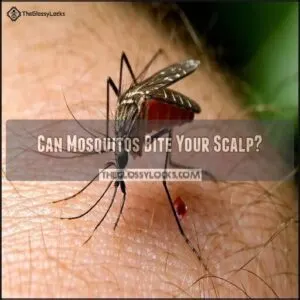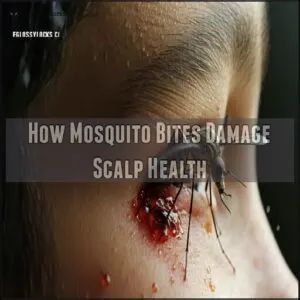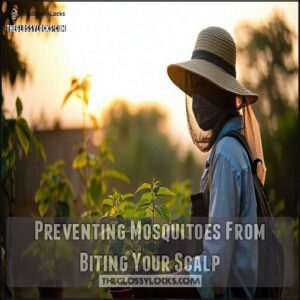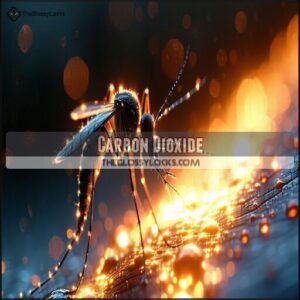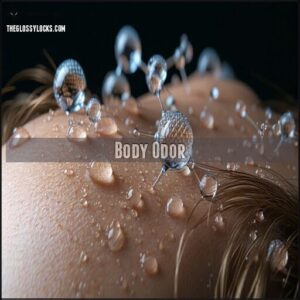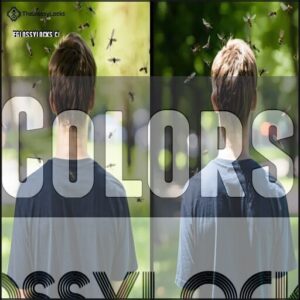This site is supported by our readers. We may earn a commission, at no cost to you, if you purchase through links.
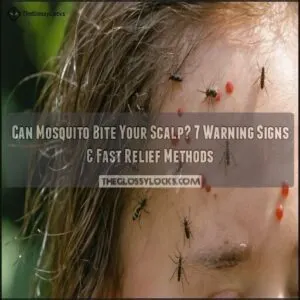 Yes, mosquitoes can bite your scalp.
Yes, mosquitoes can bite your scalp.
Despite your hair acting as a natural barrier, these persistent pests can still navigate through to reach your skin.
You’ll feel itchy, raised bumps that might be hard to spot under hair.
Mosquitoes are drawn to the carbon dioxide you exhale and the natural oils on your scalp.
If you’ve been scratching your head more than usual after outdoor activities, tiny vampires might be the culprit.
Apply cool compresses and anti-itch creams for relief.
Certain shampoos and hair products can actually attract or repel these buzzing nuisances – knowing which ingredients to look for can save your scalp from becoming a mosquito buffet.
Table Of Contents
- Key Takeaways
- Can Mosquitos Bite Your Scalp?
- What Mosquito Bites on Your Scalp Look Like
- How to Treat Mosquito Bites on The Scalp
- How Mosquito Bites Damage Scalp Health
- Preventing Mosquitoes From Biting Your Scalp
- Carbon Dioxide
- Body Odor
- Colors
- Heat and Water Vapor
- Learning
- Frequently Asked Questions (FAQs)
- Conclusion
Key Takeaways
- Yes, mosquitoes can bite your scalp despite hair acting as a natural barrier, causing itchy, raised red bumps that can be difficult to spot under your hair.
- You’re attracting mosquitoes to your scalp through carbon dioxide from your breath, body heat, unique scent chemicals, and dark-colored hair that absorbs heat.
- You can treat scalp mosquito bites with cold compresses, baking soda paste, over-the-counter antihistamines, and hydrocortisone cream to reduce inflammation and itching.
- You’ll reduce your risk of scalp bites by wearing light-colored hats, using DEET-based repellents, avoiding outdoor activities at dawn/dusk, and choosing protective hairstyles.
Can Mosquitos Bite Your Scalp?
Yes, mosquitoes can definitely bite your scalp, particularly if you have thinning hair or bald patches.
Your hair density plays a vital role in scalp vulnerability—thick hair typically forms a natural barrier, while sparse coverage leaves you exposed. When these tiny vampires land on your head, they pierce the skin with their needle-like mouthparts, injecting saliva that prevents blood clotting.
Bite severity ranges from barely noticeable to intensely itchy, depending on your sensitivity. While uncomfortable, most head mosquito bites aren’t serious, though disease transmission remains a concern in some regions.
For itch relief, avoid scratching mosquito bite hair areas, as this can lead to infection. Instead, apply cold compresses or over-the-counter antihistamines. Remember that mosquitoes are attracted to carbon dioxide from your breath and the warmth of your scalp—factors worth considering for prevention.
What Mosquito Bites on Your Scalp Look Like
How exactly can you identify those pesky mosquito bites hidden beneath your hair? When mosquitoes target your scalp, they leave distinctive red, swollen bumps that can be particularly irritating.
These bites typically appear as:
- Small, puffy round welts lighter or redder than surrounding skin
- Smooth bumps that develop over 48 hours, becoming increasingly itchy
- Random patterns of bites, larger than what bedbugs would leave
Your body’s immune response to mosquito saliva causes this reaction. While most scalp mosquito bites resolve within a week, watch for signs of Skeeter Syndrome (excessive swelling) or anaphylaxis risk in rare cases.
To check for mosquito bite symptoms on your head, part your hair carefully and use a mirror to examine any suspicious areas that feel unusually bumpy or itchy.
How to Treat Mosquito Bites on The Scalp
Now that you know what those pesky mosquito bites on your scalp look like, let’s tackle how to treat them. Quick action provides faster itch relief and helps prevent infection.
When mosquitoes leave their mark on your scalp, try these effective remedies:
- Apply a cold pack wrapped in cloth directly to the bite area to reduce inflammation and temporarily numb the itch
- Create a simple paste with baking soda and water, then gently apply it to bites three times daily for natural relief
- Use over-the-counter antihistamines like Benadryl to control itching and swelling
- Apply hydrocortisone cream to affected areas for targeted scalp care
For severe reactions, don’t hesitate to seek medical attention. Consider topical bite relief for quick soothing. If you develop fever or rash after a bite, it could indicate a more serious condition requiring professional treatment. Most scalp irritation from mosquito bites resolves within a week with proper care.
How Mosquito Bites Damage Scalp Health
When mosquitoes bite your scalp, they inject saliva that triggers inflammation and can damage hair follicles if you scratch excessively.
Your body’s immune response to these bites causes the itching and swelling you feel, potentially leading to infections or temporary hair loss in severe cases.
Why Are Mosquitoes Attracted to Your Scalp?
Once you’ve treated those itchy scalp bites, you might wonder what made you a mosquito’s dinner in the first place.
Mosquitoes find your scalp irresistible for several scientific reasons.
Your scalp is a mosquito magnet, thanks to heat, moisture, and carbon dioxide—a perfect cocktail for these tiny bloodsuckers.
| Attraction Factor | How It Works | Your Risk Level | Protection Method |
|---|---|---|---|
| Carbon Dioxide | Your breath signals "food here!" | Higher for adults | Hat coverage |
| Scalp Exposure | Thin/no hair = easy access | High for balding areas | Hair products with repellents |
| Skin Bacteria | Unique odor profile | Varies by genetics | Regular washing |
| Dark Hair | Absorbs heat mosquitoes love | Higher with dark hair | Light-colored hats |
The factors that contribute to making your scalp a target for mosquitoes include carbon dioxide from your breath, scalp exposure due to thin or no hair, skin bacteria with a unique odor profile, and dark hair that absorbs heat.
Mosquito Bites or Something Else?
Many people mistake other scalp conditions for mosquito bites. Before assuming those itchy bumps are from bloodsuckers, inspect your scalp carefully.
Look for these tell-tale signs of alternative causes:
- White eggs (nits) attached to hair shafts indicating lice
- Flaky patches with redness suggesting dandruff or psoriasis
- Tiny red bumps in patterns pointing to bed bugs
Mosquito bites on your head typically appear as isolated, raised welts that intensely itch. They’ll fade within a week if left alone. When in doubt, consult a dermatologist for proper diagnosis – bite mimicry is common, and even tactile hallucination symptoms can feel like insects crawling on your scalp.
Preventing Mosquitoes From Biting Your Scalp
After addressing how mosquito bites affect scalp health, let’s focus on keeping those pesky bloodsuckers away from your head altogether.
Protecting your scalp from mosquito bites requires a multi-layered approach.
| Protection Method | Indoor Strategy | Outdoor Strategy |
|---|---|---|
| Scalp Coverage | Use mosquito nets while sleeping | Wear hats or adopt protective hairstyles |
| Repellent Application | Install screens on windows | Apply DEET or picaridin to exposed skin |
| Environmental Control | Seal door gaps | Avoid outdoor activities at dawn/dusk |
Remember to treat your clothing with permethrin for extra protection. Consider using a full head protection when outdoors.
Pack light-colored outfits for your next outdoor adventure, as mosquitoes are less attracted to them. Your scalp health depends on solid prevention tactics.
Carbon Dioxide
Your breath’s invisible CO2 cloud acts like a dinner bell for hungry mosquitoes, who can detect your carbon dioxide from over 30 feet away.
Female mosquitoes use special sensors to track your respiration, hunting for their next blood meal.
- Limit alcohol consumption – Drinking increases your metabolic activity and CO2 production by up to 20%, making you more attractive to mosquitoes.
When your exhalation volume rises—during pregnancy, exercise, or after drinks—mosquitoes find your scalp more easily.
Using fans disrupts these carbon dioxide plumes, confusing their tracking system.
Staying in breezy areas naturally scatters your breath signature, while cooler temperatures reduce your respiration rates, helping keep your scalp bite-free.
Body Odor
While carbon dioxide gets mosquitoes in your general vicinity, it’s your body odor that seals the deal.
These tiny predators can detect your unique scent from over 100 feet away, thanks to the carboxylic acids released by your sweat glands.
Your personal odor genetics play a significant role in how attractive you’re to mosquitoes. People who naturally produce more carboxylic acids often find themselves as preferred targets.
When bacteria on your skin mix with sweat from your apocrine glands, they create pheromones that act like a dinner bell for mosquitoes.
Want fewer mosquito bites on your scalp? Regular hygiene practices can help mask the chemical signals that make you irresistible.
Colors
Your body odor isn’t the only thing attracting those pesky biters to your scalp.
The colors you wear play a surprising role too.
Mosquitoes have strong color preferences when seeking their next blood meal:
- Dark colors like black and navy absorb heat, making you more visible to heat-seeking mosquitoes
- Red shades can mimic blood, drawing mosquitoes straight to your head
- Light clothing (whites, pastels) makes you less detectable to mosquitoes hunting for their next meal
Swap dark colors for lighter options to reduce your chances of getting mosquito bites on your scalp, as this simple change can make you less visible to heat-seeking mosquitoes and less likely to be mistaken for a blood source.
Heat and Water Vapor
Beyond just being attracted to dark colors, mosquitoes have sophisticated heat and moisture detection systems that make your scalp a potential target.
While your dark shirt might initially catch their attention, it’s your body temperature and skin moisture that seals the deal.
Mosquitoes are like tiny heat-seeking missiles with humidity sensors. Your scalp, especially with wet hair after a shower, creates the perfect storm of warmth and moisture that mosquitoes find irresistible.
To combat this, maintaining proper hydration is key, as is understanding hair’s moisture retention.
Here are 5 ways mosquitoes track you down:
- They detect your body temperature from several feet away
- Higher humidity levels around your skin make you more attractive
- Evaporation rates from your skin create invisible vapor trails
- Wet hair increases scalp moisture, creating a mosquito magnet effect
- Bacteria on your scalp produce compounds that enhance heat signals
Understanding these attraction factors helps you avoid becoming an all-you-can-eat buffet for these pesky bloodsuckers.
Learning
Adapting to mosquito behavior can dramatically reduce your risk of scalp bites.
Mosquitoes actually learn from their experiences, remembering which hosts provided easier meals.
Understanding different Learning Styles for Bite Awareness helps you protect your hair mosquito bite zones.
These pests remember successful feeding locations, including your scalp if they’ve bitten there before.
With proper Repellent Education, you’ll know that DEET-based products work best for scalp protection.
Improve your Risk Perception by recognizing that mosquitoes favor the hairline and areas with thinner coverage.
Itch Management techniques for mosquito bites itchy scalp include cold compresses and antihistamines.
When dealing with mosquito bite head discomfort, avoid scratching, which only intensifies itching.
Instead, apply appropriate treatments to soothe your itchy scalp mosquito reactions and prevent infection, utilizing effective Itch Management techniques.
Frequently Asked Questions (FAQs)
Why do mosquitoes bite your scalp?
Mosquitoes target your scalp because they’re drawn to carbon dioxide you exhale, body heat, and scent.
They’ll bite through thin hair or exposed areas where they can easily access blood-rich skin.
What happens when a mosquito bites on your head?
Like tiny vampires feasting on your crown, mosquitoes inject saliva that causes itchy, red bumps on your scalp.
You’ll experience swelling, redness, and irritation, just like bites elsewhere on your body.
Can mosquito bites cause hair loss?
No, mosquito bites don’t cause hair loss.
While they may create temporary itchy bumps on your scalp, there’s no scientific evidence linking mosquito bites to permanent hair loss or follicle damage.
Do mosquitoes bite through hair products?
Hair products won’t fully shield your scalp from mosquito bites.
These persistent pests can still navigate through styling gels, hairsprays, and other products to reach your skin for a blood meal.
Are scalp bites worse than body bites?
Scalp bites aren’t inherently worse than body bites, but they can feel more irritating.
You’ll often notice increased itchiness due to the scalp’s rich blood supply and because they’re harder to treat effectively.
Can mosquitoes transmit lice to the scalp?
No, mosquitoes can’t transmit lice to your scalp.
These are entirely different insects with separate life cycles.
Mosquitoes feed on blood, while lice specifically live on human hosts and spread through direct contact.
Do certain hairstyles attract more mosquitoes?
Your hairstyle can influence mosquito attraction.
Wet hair, dark-colored hair, and thinning styles that expose your scalp make you more vulnerable to bites.
Thicker hairstyles provide natural protection against these pesky biters, offering a level of defense with thicker styles.
Conclusion
Preventing pesky parasites from puncturing your scalp is possible with proper precautions.
Remember, mosquitoes can bite your scalp despite hair coverage, so don’t dismiss unusual itching.
Apply repellents before outdoor activities, wear hats when possible, and choose hair products with natural deterrents like citronella or tea tree oil.
By understanding what attracts mosquitoes and taking proactive steps, you’ll protect your scalp from becoming a feeding ground and enjoy itch-free summer evenings.
- https://my.clevelandclinic.org/health/diseases/17695-mosquito-bites
- https://www.healthline.com/health/why-do-mosquitoes-bite-some-people-more
- https://www.mayoclinic.org/diseases-conditions/mosquito-bites/symptoms-causes/syc-20375310
- https://www.cdc.gov/mosquitoes/about/about-mosquito-bites.html
- https://www.webmd.com/allergies/what-is-skeeter-syndrome

